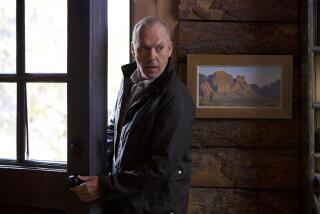Review: Alan Clarke’s 1979 film ‘Scum’ remains a hard-hitting exposé of British youth prisons
“The punitive system does not work.” By the time those words are spoken in Alan Clarke’s devastating 1979 film, “Scum,” the viewer will scarcely be in need of further persuasion.
A ferocious exposé of life in Britain’s notorious borstals, or youth detention centers, the movie tells you much that you probably already know about incarcerated young men, their vicious pecking orders and the corrupt authorities overseeing their rehabilitation. But it tells it with scalding wit and coolly riveting style, in the visual equivalent of spare, brilliant prose that occasionally bleeds (and bleeds and bleeds) into poetry.
Newly restored by Kino Lorber, the film set to play a week-long run at Cinefamily is the uncensored, 96-minute version of a controversy-stirring project that originated in 1977 as a television play. Directed by Clarke and written by Roy Minton, that meticulously researched 78-minute production was commissioned as part of the BBC’s “Play for Today” anthology series, but was withheld from broadcast due to its shocking violence.
Clarke, showing the fearlessness that would cement his reputation as one of the U.K.’s most uncompromising social realists, responded by remaking the material in 1979 as a theatrical feature that proved even more graphic and unsparing in its treatment of the borstal’s dehumanizing conditions.
The charges of obscenity and calls for censorship that greeted the new version were, if anything, a testament to its excoriating power. When it was finally shown on television in 1983, by which point the borstal system had been reformed, Clarke’s ghastly depiction of officially sanctioned violence, rape, suicide and other horrors had already taken on the stench of truth.
In conventional prison-drama fashion, “Scum” brings us into its grotty world through the eyes of a newly arrived inmate. If the heavy-set Carlin seems fresher than most, it’s probably because he’s played by a twentysomething Ray Winstone, looking impossibly young and smooth-cheeked, with nary a visible trace of the gravel-voiced tough guys he would later play in movies like “Sexy Beast.”
Well before the end of “Scum,” however, you can already see that beefy prototype taking shape. Carlin may keep his head down at first, replying “yes, sir” to every barked command, but he instinctively understands the laws that govern this white-walled Gehenna. After taking more than his fair share of soul-crushing punishment from fellow inmate Banks (John Blundell), the wing’s menacing designated “daddy,” Carlin swiftly retaliates with a handily improvised weapon (that billiard table in the recreation room isn’t just for show) and a clear understanding of the ruthlessness that will be required of him to not just survive, but prevail.
Carlin’s brutal rise to power makes for a compelling central narrative, albeit one that, under Clarke’s pitiless, clear-eyed gaze, never runs the risk of tilting into exploitation. No less fascinating is the rather less conventional route taken by Archer (a superb Mick Ford), an unusually well-spoken and intellectually gifted inmate who enjoys trolling the warders at every step. He does this by playfully adopting all manner of faddish personal convictions, from vegetarianism to Islam; the latter offense earns him an audience with the chaplain while underscoring the hypocrisy of this ostensibly Christian institution.
The juxtaposition of Carlin’s and Archer’s very different strategies lends “Scum” the outline of a dialectic. But the film’s chief narrative accomplishment is the astonishingly detailed picture it sketches of the internal forces at work. We learn something of the grubby economy of life behind bars, as well as the venal motives driving the warders, who maintain order by empowering their most thuggish charges.
We learn something too of the uneasy coexistence between the borstal’s white and black inmates, even if the latter tend to remain on the periphery of the drama. Among the more prominent black characters are Angel (Alrick Riley), a boy who arrives the same day Carlin does, and Toyne (Herbert Norville), an older youth who is dealt one of the film’s most tragic hands.
Without ever abandoning a realist framework, Clarke and Minton skillfully advance several plot lines concurrently, bringing their characters’ different experiences into tight focus and showing them all, in the end, to be equally wretched. It’s this realization that lends such shattering force to the movie’s climactic scenes, in which the voices of the inmates are raised in unison at long last, only to be drowned out by a cruel and deafening silence.
It’s hard to watch “Scum” today (that sentence could end right there) without seeing its narrative and stylistic influence on numerous British prison dramas that have emerged since, Steve McQueen’s “Hunger” and David Mackenzie’s “Starred Up” not least among them. It’s a reminder of the enduring if underappreciated legacy of Clarke, who worked primarily in television and succeeded in putting his aesthetic signature on what has historically been considered a writer’s medium.
In “Scum,” one of only three features he directed for the big screen, Clarke finds a bleak beauty in an institution devoted to controlling, yet also propagating, all manner of human ugliness. His visual style serves the material at every turn, but you can see the controlled mastery in the way he moves the camera, testing out the carefully choreographed long takes that he would deploy to such chilling effect in films like his 1989 short, “Elephant.”
There is calculation in this fluid aesthetic. But there is clarity in it too, as if Clarke were saying that to tear down a broken system from within, you have to start by seeing it whole.
------------
‘Scum’
Rating: R
Running time: 1 hour, 36 minutes
Playing: Cinefamily, Los Angeles
See the most-read stories in Entertainment this hour »
Movie Trailers
ALSO
The best films of 2017 — so far. Here’s what our film critics think
Review: Edgar Wright’s exuberant ‘Baby Driver’ is an automotive musical like no other
More to Read
Only good movies
Get the Indie Focus newsletter, Mark Olsen's weekly guide to the world of cinema.
You may occasionally receive promotional content from the Los Angeles Times.







